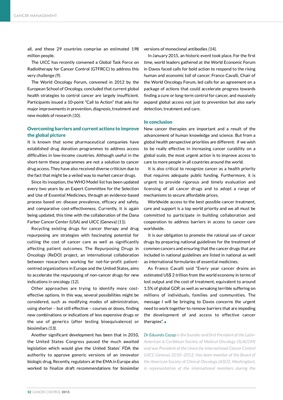
all, and these 29 countries comprise an estimated 198
million people.
The UICC has recently convened a Global Task Force on
Radiotherapy for Cancer Control (GTFRCC) to address this
very challenge (9).
The World Oncology Forum, convened in 2012 by the
European School of Oncology, concluded that current global
health strategies to control cancer are largely insufficient.
Participants issued a 10-point "Call to Action" that asks for
major improvements in prevention, diagnosis, treatment and
new models of research (10).
Overcoming barriers and current actions to improve
the global picture
It is known that some pharmaceutical companies have
established drug donation programmes to address access
difficulties in low-income countries. Although useful in the
short-term these programmes are not a solution to cancer
drug access. They have also received diverse criticism due to
the fact that might be a veiled way to market cancer drugs.
Since its inception, the WHO Model list has been updated
every two years by an Expert Committee for the Selection
and Use of Essential Medicines, through an evidence-based
process based on: disease prevalence, efficacy and safety,
and comparative cost-effectiveness. Currently, it is again
being updated, this time with the collaboration of the Dana
Farber Cancer Center (USA) and UICC (Geneva) (11).
Recycling existing drugs for cancer therapy and drug
repurposing are strategies with fascinating potential for
cutting the cost of cancer care as well as significantly
affecting patient outcomes. The Repurposing Drugs in
Oncology (ReDO) project, an international collaboration
between researchers working for not-for-profit patientcentred
organizations in Europe and the United States, aims
to accelerate the repurposing of non-cancer drugs for new
indications in oncology (12).
Other approaches are trying to identify more costeffective
options. In this way, several possibilities might be
considered, such as modifying modes of administration,
using shorter - but still effective - courses or doses, finding
new combinations or indications of less expensive drugs or
the use of generics (after testing bioequivalence) or
biosimilars (13).
Another significant development has been that in 2010,
the United States Congress passed the much awaited
legislation which would give the United States' FDA the
authority to approve generic versions of an innovator
biologic drug. Recently, regulators at the EMA in Europe also
worked to finalize draft recommendations for biosimilar
CANCER MANAGEMENT
52 CANCER CONTROL 2015
versions of monoclonal antibodies (14).
In January 2015, an historic event took place. For the first
time, world leaders gathered at the World Economic Forum
in Davos faced calls for bold action to respond to the rising
human and economic toll of cancer. Franco Cavalli, Chair of
the World Oncology Forum, led calls for an agreement on a
package of actions that could accelerate progress towards
finding a cure or long-term control for cancer, and massively
expand global access not just to prevention but also early
detection, treatment and care.
In conclusion
New cancer therapies are important and a result of the
advancement of human knowledge and science. But from a
global health perspective priorities are different: if we wish
to be really effective in increasing cancer curability on a
global scale, the most urgent action is to improve access to
care to more people in all countries around the world.
It is also critical to recognize cancer as a health priority
that requires adequate public funding. Furthermore, it is
urgent to provide rigorous and timely evaluation and
licensing of all cancer drugs and to adopt a range of
mechanisms to secure affordable prices.
Worldwide access to the best possible cancer treatment,
care and support is a top world priority and we all must be
committed to participate in building collaboration and
cooperation to address barriers in access to cancer care
worldwide.
It is our obligation to promote the rational use of cancer
drugs by preparing national guidelines for the treatment of
common cancers and ensuring that the cancer drugs that are
included in national guidelines are listed in national as well
as international formularies of essential medicines.
As Franco Cavalli said "Every year cancer drains an
estimated US$ 2 trillion from the world economy in terms of
lost output and the cost of treatment, equivalent to around
1.5% of global GDP, as well as wreaking terrible suffering on
millions of individuals, families and communities. The
message I will be bringing to Davos concerns the urgent
need to work together to remove barriers that are impeding
the development of and access to effective cancer
therapies". l
Dr Eduardo Cazap is the founder and first President of the LatinAmerican
& Caribbean Society of Medical Oncology (SLACOM)
and was President of the Union for International Cancer Control
(UICC-Geneva) 2010-2012. Has been member of the Board of
the American Society of Clinical Oncology (ASCO, Washington),
in representation of the international members during the